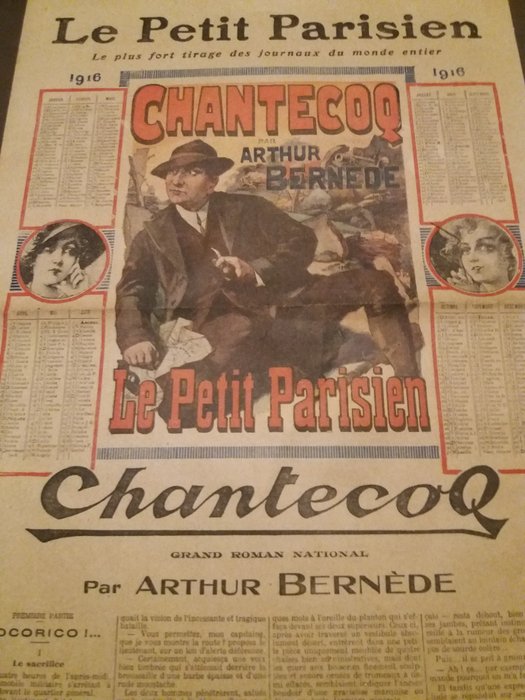 |
| Arthur Bernède (1871 - 1937) |
I first translated the detective's original adventure, Chantecoq and the Aubry Affair, back in 2014, and this current run of books was mostly translated over the last twelve months. At sixty thousand words a pop... well, I've worked out I've translated well over half a million words of Chantecoq adventures to date, and there's still four books I've not even looked at.
Blue Train, as I'll call it for the rest of this post, marks a landmark in Chantecoq's career in several respects. It was published in 1929 as the first of the Further Exploits of Chantecoq series. Introduced by a short preface where the detective himself turns up at Arthur Bernède's house to complain that the author has forgotten about him, Chantecoq has moved on, even from the events of 1927's Belphegor. His daughter, now married to reporter Jacques Bellegarde, comes over to visit, but her supportive role has been taken over by Météor, a young man who idolises the king of detectives, and who will develop over the course of eight books with a care and attention to detail which is rarely afforded to supporting characters in pulp fiction.
But although Blue Train heralds a new chapter in Chantecoq's life, it surely can't be coincidence that it appeared barely a year after Agatha Christie published the Poirot novel Mystery of the Blue Train in 1928. The similarities end there, however. While much of Christie's book unfolds on the "Train Bleu" itself, Chantecoq's adventure takes place almost entirely in Paris, as he investigates a murder committed in Marseille several months earlier.
A prolific novelist and screenwriter, and a shrewd operator, it's fair to say that Bernède certainly wouldn't have been above riding Christie's coat-tails with a familiar title for the first novel in his new series. But he had the confidence to avoid echoing any more of Poirot's adventure as he instead establishes the template for the next eight novels. This is more of an adventure story than a true mystery, and while Chantecoq's "little grey cells" are easily a match for those of his famous Belgian counterpart, Bernède makes sure that the reader is always half a step ahead of the great bloodhound. Chantecoq's ability to solve a mystery is never in doubt. What Bernède seeks to show us is a detective who is completely confident in his abilities, to the extent that he intends to have some fun while exposing a murderer and clearing an innocent's name.
The "Further Exploits of Chantecoq" have never been translated into English before, and they're hard to get hold of in French. It's my serious hope that through these translations, Chantecoq will soon win back his rightful place in the pantheon of literary detectives.
